A rethink needed on schools cricket says Ed Smith
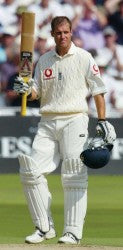 Ed Smith played cricket for England three times, before a freak ankle injury cut short a promising career.
Ed Smith played cricket for England three times, before a freak ankle injury cut short a promising career.
The former Kent and Middlesex opener has now carved out a successful career in the media, and has also written three books, the latest of which, Luck, hit the bookshops this April.
Here, Ed talks about how his career was formulated on the wickets of Tonbridge School, bemoans the lack of sportsfields in the state school system and suggests that a rethink is in order by the Government.
Many a groundsman would argue that 'luck' or good fortune rarely plays a role in the successful preparation of a playing surface. The same could be said for elite sportsmen, where reaching the top seems largely more the result of hard work and toil than chance.
This idea of 'luck' has been on the tips of some influential tongues lately. In May, Education Secretary. Michael Gove. delivered a speech to Brighton College students about the virtues of equal opportunities in education.
In it, he quoted extracts from a new book by a former England cricketer who has been wrestling with how opportunities that opened up early in his life shaped his career, and continue to influence how young people fulfil their potential (or not) today.
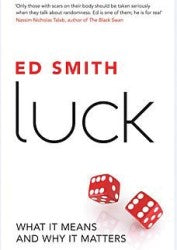 In the intriguingly-titled 'Luck', Ed Smith, the Tonbridge School-educated, former England international turned national newspaper journalist and radio broadcaster, highlights the disparity between the state and private sectors in generating first-class athletes, and draws on his own experience of growing up with a school cricketing surface that was, in his belief, second only in the world to Lord's.
In the intriguingly-titled 'Luck', Ed Smith, the Tonbridge School-educated, former England international turned national newspaper journalist and radio broadcaster, highlights the disparity between the state and private sectors in generating first-class athletes, and draws on his own experience of growing up with a school cricketing surface that was, in his belief, second only in the world to Lord's.
A glowing verdict delivered on the maintenance prowess of the Kent independent educational establishment, but the impact of that premier quality provision, on nurturing Smith's innate talent and channelling his devotion to cricket, he is now exploring through print.
Twenty-five years ago, of the thirteen players who represented England on a tour of Pakistan, only one had attended a private school. In contrast, today, over two-thirds of the current team are privately educated. "You're twenty times more likely to go on and play for England if you go to a private rather than a state school," Smith records.
The composition of the England rugby union team and the British Olympic squad reveals a similar trend. Of those members of England's XV born in that country, more than half were privately educated. Meanwhile, half the UK's gold medallists at the Beijing Olympics in 2008 were privately educated, compared with just seven percent of the population.
For Gove to draw so heavily on Ed Smith's own findings may speak volumes about the present and future health of UK sport and lets us ponder this notion of good luck, or rather the "good fortune" of growing up in an environment that allows the seeds of sporting prowess to flower.
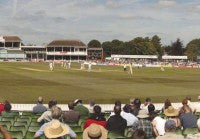 Ed started playing cricket competitively aged just eight, having watched Kent with his dad from very early on. Whilst Kent was his team, his hero was Yorkshireman and cricket icon Geoffrey Boycott, a man he was drawn to not solely for his cricketing excellence.
Ed started playing cricket competitively aged just eight, having watched Kent with his dad from very early on. Whilst Kent was his team, his hero was Yorkshireman and cricket icon Geoffrey Boycott, a man he was drawn to not solely for his cricketing excellence.
In his book he writes: "Even as a child, I sensed there was something in Boycott that was different - an application of willpower, an elimination of error, an unbendingness and relentlessness.
"I think all those traits appealed deeply to my over-developed sense of rationality and ambition. Could a child possibly sense in a hero something of himself? It sounds silly, doesn't it? But I think it is true."
Ed progressed from Kent schools - scoring 100 on his debut - to Cambridge University, where he graduated with a double first in history, after becoming the youngest ever Cambridge undergraduate to score a century on his first class debut, aged eighteen.
Cricket for the Kent professional team followed and, in 1999, he became a full-time professional cricketer with the county club when still only 21.
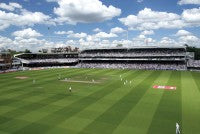 He played professional cricket for 13 years, at Kent and then for Middlesex, where he captained the first eleven in 2007 and 2008. Ed took the field for England in three Tests, before he was forced to retire after breaking his ankle in 2008.
He played professional cricket for 13 years, at Kent and then for Middlesex, where he captained the first eleven in 2007 and 2008. Ed took the field for England in three Tests, before he was forced to retire after breaking his ankle in 2008.
Taking a quick break from a busy calendar, now dominated by press, TV and radio commitments, Ed mulled over some of the most pressing issues he addresses in 'Luck', commenting on everything from his time at Tonbridge School, the shift in focus of school sports, his experiences with groundsmen and what he thinks is the answer to help redress this trend of private school dominance in top-flight sport.
Luck may have been an unthinkable title for a book written by a younger Ed Smith, who was largely dismissive of the notion in achieving success. He waxes lyrical about how superstition dictated his early life and his entry to university in 1996. Once, he wouldn't have considered his rise to the top as lucky at all, but the benefit of hindsight and experience led him to contend that his upbringing helped expose him to a level of quality in cricketing provision that helped hone his game.
"When you're young, you never really acknowledge that you're in some way lucky, especially if you're a child growing up in the kind of surroundings that I did at Tonbridge School."
"You take a lot for granted and assume that what you have is the norm. In the case of my school, it was the unrivalled quality of the cricketing surface that I just didn't comprehend when I was a student."
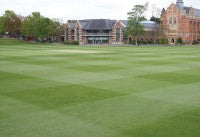 "At Tonbridge, we had ten grass nets, ten synthetic turf nets and, come the weekend, the wicket was always in pristine condition, which was testament to the then head groundsman, George Alexander."
"At Tonbridge, we had ten grass nets, ten synthetic turf nets and, come the weekend, the wicket was always in pristine condition, which was testament to the then head groundsman, George Alexander."
Ed hadn't appreciated that the wickets at his disposal - blessed with pace and surrounded by an immaculate outfield - would help lay the foundations for his rise to the top. It was only when he reached elite level that he was able to fully understand just how formative the surfaces were at school and how much their quality shaped his early development in the sport, he says.
At Cambridge, Ed's achievements and drive to excel was further enhanced as he went on to rewrite the history books, scoring a century on his first-class debut for Cambridge, aged 18 years 9 months, to become the youngest-ever player to notch up that milestone.
He was able to, once again, exploit some of the best sporting facilities and be exposed to an environment that has been the breeding ground for other cricketing greats.
Even at university though, it proved difficult to find the quality to match that at Tonbridge. "University cricket was very good, but you couldn't always get grass nets to the standards we enjoyed at school," he reveals.
Cricket groundmen have recollected how cricketers 'acted the diva', slamming surfaces and demanding that staff do this or that with the pitch. Ed was most definitely not one of these - rather he grew up with a willingness to interact with turfcare professionals, again rooted in his early experiences of the professionalism of George Alexander, perhaps akin to our enduring memories of a school-teacher or lecturer whose own passion for their subject ignited our interest.
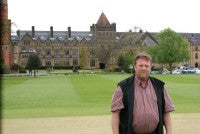 "I got to know George really well when I was a student," Ed recalls. "We all did, to some extent. It was part and parcel of cricket at Tonbridge. I'd talk with him about how we wanted the wicket to play and what we were expecting from the weekend fixture. He was always willing and open to chat with us. He is an excellent groundsman."
"I got to know George really well when I was a student," Ed recalls. "We all did, to some extent. It was part and parcel of cricket at Tonbridge. I'd talk with him about how we wanted the wicket to play and what we were expecting from the weekend fixture. He was always willing and open to chat with us. He is an excellent groundsman."
"In all honesty, throughout my career, I always used to talk with the groundsman wherever I was playing - to see how they were setting up and just to interact really. It's important to understand that side of things, even though I don't claim to be an expert on the subject by any stretch."
He continues: "Growing up with such excellent facilities does set the bar high though, and you soon learn what a high quality surface plays like. All the facilities at Tonbridge were brilliant, not just the cricket, the rugby pitches too; so flat you could use a spirit level," he jokes.
Coming from a big teaching family, Ed has had the benefit of peering over both sides of the fence, with parents and grandparents working in state and private education.
He uses his "big sister" Rebecca to draw the comparison with those two worlds, comparing how she fared in sport to his own experiences. "Becky was a fiercely competitive sportsperson, so we both possessed the right ingredients to succeed in sport. She went to a Kent grammar school, I went to an independent school where my father taught - boys only. She went on to study English at Oxford, but did not play sport. Only later did I think of the reasons behind her fall-off in participation.
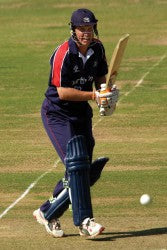 "In a sense, my sister and I were part of an accidental educational experiment. Take two children with similar genes and similar talent: send one to a state school and the other to an independent school. What happened to my sister's sporting experience was that she ran out of opportunities - not completely, but significantly. What happened to my sporting experience was that I received the best sporting education money can buy. I played cricket for England. She didn't play for any team, in any sport, ever again."
"In a sense, my sister and I were part of an accidental educational experiment. Take two children with similar genes and similar talent: send one to a state school and the other to an independent school. What happened to my sister's sporting experience was that she ran out of opportunities - not completely, but significantly. What happened to my sporting experience was that I received the best sporting education money can buy. I played cricket for England. She didn't play for any team, in any sport, ever again."
For the state sector, "resources will always pose their biggest problem, but I don't think it has always been that way. Both my grandfathers were headmasters in the state and private sector, and both knew the value that sport brought in schools and the importance of good surfaces. Sport helps develop a sense of identity. Eric Scarborough, my maternal grandfather, used to roll the wicket himself."
Whilst Ed was "lucky" in that he was exposed to such fine facilities during his schooldays, "I knew all to well the potential pitfalls of state sector sport, as I'd often hear from my parents and grandparents about what sport at state level has to contend with."
"There's been a chunk of money thrown at improving access in the state sector and a surge of spending under the Labour government, especially with the proliferation of synthetic surfaces in urban areas, which is great in improving participation levels, but it does put those coming from particularly inner-city state schools at a disadvantage to those, like me, who had the luxury of immaculate grass provision."
At school, "it was an age of ultra-specialisation, focusing in/narrowing down on certain sports," Ed recalls. Compare that with today's turfcare sector, he adds, where, especially in state sector schools, "it's more about non-specialised facilities that cater for multisports."
The Chance to Shine charity is one agency which has been instrumental in improving access to cricket in the state school system. A critical task, because "statistics show that some 90% of state school attendants have no access to cricket at all, which is a trend that needs to be addressed if we are to start seeing more elite players drawn from the state sector," suggests Ed.
Ed looks back nearly fifty years to a watershed in cricket. 1966 began a state-school era of England captains with Brian Close and then Ray Illingworth. "In my time, the school system was the focus of development. The sport has shifted more to the club model, away from the schools' model that I knew, which may explain to some extent the fall in elite cricketers coming from the state sector."
"Schools like Tonbridge will always have the wherewithal to offer top quality facilities, but I think it needs to be offered at a schools and club level. School can be an important breeding ground if provision is good." And on that note he introduces a line or argument that I heard powerfully expressed last year by Alex Welsh of the London Playing Fields Association.
"One of the big problems, where cricket is concerned, is that pitches have, for far too long, been contracted out for maintenance. This would often be local authority and it would be a case of one man giving ten minutes a day to five schools. As we all know, a cricket pitch needs love, attention and time, which you really have to have someone permanently on board to work on it."
This exposure to high standards for some and not others has helped shape Ed's reasoning for innate talent rather than nurtured success through the daily grind of constant practice, believing that talent today is seen as a cause of reproach.
But, he is convinced that the influence of talent in sport is set to strengthen rather than diminish. "In prospect, talent is a good thing to have. In retrospect, it is almost a guilty secret." When interviewed, winning sportspeople refer to the long hours of practice that have fashioned their success, but innate talent will have its part, Ed maintains.
Yet, across sport at elite level, when the method and degree of training is becoming more uniform, the leading edge that, say, supreme fitness once conferred on one player over another is vanishing. The one advantage that will remain and grow in importance is talent, he believes.
"If better sporting education was freely available to all young people in England, as it was to me, I probably wouldn't have played for England. Someone with more innate talent would have taken my place. They didn't. Lucky for me. Not so lucky for England."
Is this also true of great groundsmen - are they born or made? Ed may argue that they are born, as innate talent can lie in many fields, from sport and science to business and the arts, so why not groundsmanship?
An early natural affinity with grass - the groundsman's 'stock in trade' - surely is an indicator of natural talent, nurtured by having the appropriate tools and equipment to hand, as well as the freedom to experiment, test and trial, much as the finest sportspeople do. An advocate of the role and importance of the head groundsman, Ed believes that a more trusting approach from those in management is called for.
"My parents used to tell me horror stories about poor cricketing surfaces at state level. One case that springs to mind was a child breaking teeth on a bobbly wicket. Parents then don't want their children to play anymore, and that's when demand falls and the sport suffers."
"Having groundsmen dedicated to producing high quality playing surfaces is surely the way forward to ensure standards can be maintained well. This all comes down to cost though, and the private sector has the greater pulling power finance-wise to allow them to attract the best out there."
"I don't want to lecture groundsmen on how to do their job," Ed is quick to stress. "I don't understand the scientific nature of the trade, but what I will say, from my own experience, is that getting schoolchildren more involved is a sure fire way of them gaining a sense of ownership over the pitch and the quality of it."
My grandfather Eric used to persuade his pupils to help him on the wicket. I would have gladly pitched in, if I had been asked. If young players know what's involved, they will care more, which will ultimately be good for cricket. More grounds need to receive the attention and love that those at Tonbridge School did, and still do."
Selling off playing fields and pitches has become a highly emotive issue, with many vulnerable to what Ed touched on earlier - lack of use for whatever reason and a fall in quality somehow justifying the decision to scrap them in favour of more housing and commercial development.
"The best way to protect a playing field is to have it in use all the time. Some might say that much has been done to create new playing fields and spaces for sport, but this is not always for cricket provision which, of course, requires more space and time to prepare."
It comes as no surprise to learn that Ed has worked alongside Alex Welsh and the LPFA, which are both active in promoting the preservation of natural turf in the capital. "Alex believes - and I echo this sentiment - that the best way to protect sports pitches is to keep them in use."
"Having access to the best facilities is something I've been lucky enough to experience, and it's something that leaves a lasting impact, whether that be Tonbridge or Lord's - a place that certainly still has a special place for me."
I feel it appropriate to end on Ed's recollection of cricketing life at the home of the game during his time playing for Middlesex. Sentiments that groundsmen across the country will surely summon up in their own way, on their own terms, about their own patch of green.
"A small part of the soul secretly sings, each and every time, as you walk through the Long Room and on to the billiard-table smooth turf of Lord's. The ground never looks better than in high summer, in the soft yellows of a late-afternoon sun. The grandstand was casting long shadows over perfectly tended grass. As the finest cricket ground in the world, Lord's is pretty damn sexy."
I for one look forward to Ed's next book, but I secretly hope that he may apply his logic, analysis and highly approachable, grass-roots style to turfcare some time soon.



